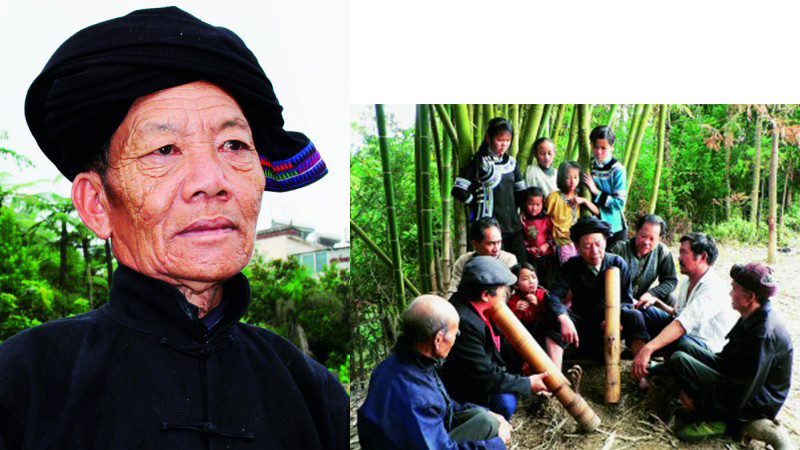 alt="Puer Surrounding Counties and Towns: Weekly & Special Local Markets Travel Guide"
/>
alt="Puer Surrounding Counties and Towns: Weekly & Special Local Markets Travel Guide"
/>
Zhu Xiaohe – Inheritor of Hani Four Seasons Production Ditties in Yuanyang County, Honghe
Profile
Zhu Xiaohe(朱小和), male, Hani Nationality, born in 1940, is a member of Yuanyang County(元阳县), Honghe Hani Autonomous Prefecture(红河哈尼族自治州). He is the inheritor of the Four Seasons Production Ditties of Hani Ethnic Minority(哈尼族四季生产调).
Mopi
Mopi(莫批) is a transliteration of Hani ethnic language, which means the elder with superb wisdom. Mo is the meaning of the elder. Pi is meaning of a wise man with broad knowledge. Mopi, also known as Beima(贝玛), refers to the priests of the Hani ethnic nationlity and is the host of various religious sacrifice activities in the Hani ethnic groups. He is also the inheritor of Hani traditional culture.
Mopi can be divided into three types: Yangpi(仰批), Wengpi(翁批) and Goupi(沟批). Yangpi is the highest priests of the Hani ethnic group. He knows the social history of the Hani ethnic group and religious sacrifices, and presides over the funeral activities of the highest rank of the Hani ethnic group.

Personal Experiences
Zhu Xiaohe and his family used to be a well-known family of Mopi in the area. Influenced by the family environment, he had a strong interest in Hani folk culture since childhood, and often followed his grandfather Zhu Houre(朱候惹) to learn to sing Hani folk songs.
In 1954, Zhu Xiaohe learned to sing Hani folk songs from Pu Keluo(普科罗). After years of hard study, his singing of Hani Haba(哈尼哈巴) has been widely recognized by the local Hani ethnic people, and has become a well-known singer on both sides of the Red River.
Achievement
From 1985 to December 2002, Zhu Xiaohe sang Hani folk oral literature such as Hani Apei Congpopo(哈尼阿培聪坡坡) and Hani Ancient Songs(哈尼族古歌) in Guangdong(广东), Shenzhen(深圳) and Kunming(昆明).
In 1995, Zhu Xiaohe won the first prize of the second Yunnan Literature and Art(第二届云南文化艺术大赛) Creation Award for his singing of epic of creation Woguoceniguo(窝果策尼果).
In 2002, he was named as Master of Yunnan Ethnic Folk Music(云南民间民族音乐大师) by Yunnan Culture Department and Yunnan Ethnic Affairs Committee(云南省民族事务委员会).
Chinese Version:http://www.ynich.cn/view-ml-13110-805.html
Translated by Olive/张银芳

 7 Days GolfingTour
7 Days GolfingTour
 8 Days Group Tour
8 Days Group Tour
 8 Days Yunnan Tour
8 Days Yunnan Tour
 7 Days Shangri La Hiking
7 Days Shangri La Hiking
 11 Days Yunnan Tour
11 Days Yunnan Tour
 6 Days Yuanyang Terraces
6 Days Yuanyang Terraces
 11 Days Yunnan Tour
11 Days Yunnan Tour
 8 Days South Yunnan
8 Days South Yunnan
 7 Days Tea Tour
7 Days Tea Tour
 8 Days Muslim Tour
8 Days Muslim Tour
 12 Days Self-Driving
12 Days Self-Driving
 4 Days Haba Climbing
4 Days Haba Climbing
 Tiger Leaping Gorge
Tiger Leaping Gorge
 Stone Forest
Stone Forest
 Yunnan-Tibet
Yunnan-Tibet
 Hani Rice Terraces
Hani Rice Terraces
 Kunming
Kunming
 Lijiang
Lijiang
 Shangri-la
Shangri-la
 Dali
Dali
 XishuangBanna
XishuangBanna
 Honghe
Honghe
 Kunming
Kunming
 Lijiang
Lijiang
 Shangri-la
Shangri-la
 Yuanyang Rice Terraces
Yuanyang Rice Terraces
 Nujiang
Nujiang
 XishuangBanna
XishuangBanna
 Spring City Golf
Spring City Golf
 Snow Mountain Golf
Snow Mountain Golf
 Stone Mountain Golf
Stone Mountain Golf












 What Our Customers Say?
What Our Customers Say?
